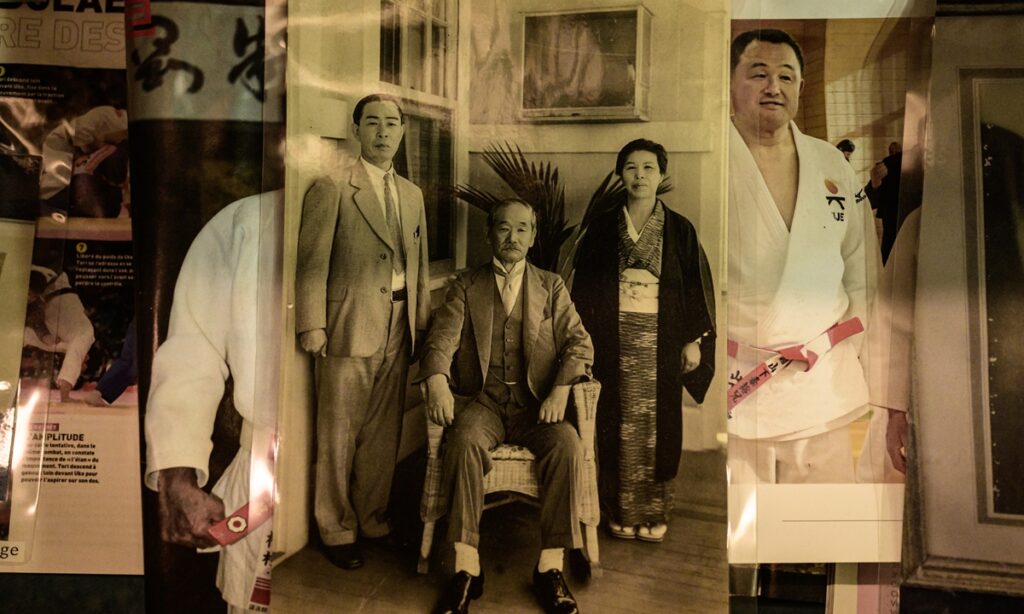Jigoro Kano’s picture hangs in dojos worldwide, but the Japanese founder of judo is sometimes overlooked in his own hometown of Kobe – something fans are hoping the Tokyo Olympic Games will change.
Kano was born about 160 years ago in Mikage, an upper-class residential neighborhood of the western city, to a family that has run sake breweries for generations.
Some of his descendants still live in the town, brewing the traditional Japanese tipple, and are looking forward to their ancestor getting a bit more local name recognition when judo features in the 2020 Olympic Games, now postponed until 2021 due to coronavirus.
“Of course, we are proud of him,” said Taketo Kano, part of Kano’s extended family and chairman of major brewer Kiku-Masamune.
“He was the biggest success in our family. He was a great man,” the 76-year-old told AFP at his brewery, with the sweet scent of rice-derived sake hanging in the air.
Kano left the waterfront town for Tokyo as a child, and later established judo by combining different forms of jujutsu martial arts with ideas including spiritual discipline.
His judo techniques and teachings are popular around the world, and for some judoka, Kano holds almost semi-divine status.
His black-and-white portrait hangs in dojos or training halls in many countries, following the practice at the Kodokan, judo’s headquarters in Tokyo, which attracts pilgrims from around the world.
Drawing a blank
But his name sometimes draws blank stares on the streets of Mikage.
“Who?” said Yuya Goto, a 28-year-old construction worker in Kobe, when asked if he was familiar with Kano.
“I practiced judo in junior high school but I didn’t really care about who founded it,” Goto told AFP.
Ryohei Takashima, a 74-year-old local resident, says younger Kobe natives in particular are often clueless about the hometown hero.
“The Tokyo Olympics is a window of opportunity to enhance local people’s awareness of his name,” he told AFP.
Hoping to capitalize, Kobe distributed a new book on Kano’s life to all the city’s elementary schools in 2020.
“We hope to help enhance students’ awareness of our local hero at a time when the Olympics are expected to shed fresh light on his accomplishments,” a city official said.
Local authorities are also considering making a promotional video to showcase his links to the city, though similar projects have had to be scrapped over budget cuts linked to the coronavirus crisis.
Kano is seen as a trailblazer for sports in Japan more generally: He was the first Asian member of the International Olympic Committee in 1909 and traveled internationally to demonstrate judo.
He was a keen campaigner for Japan to host the Olympic Games and for judo to be included in the program – efforts that bore fruit after his death when the 1964 Olympic Games were held in Tokyo, with Kano’s sport included for the first time.
Mutual prosperity
He also founded the nation’s first physical education college program, became the forerunner of the Japan Sports Association, and helped establish one of Japan’s best high schools – the Nada School in Kobe.
“Kano is known as the founder of judo but is not mentioned as an educator a lot,” the school’s headmaster Magohiro Wada told AFP.
Yusaku Yoneda, a 15-year-old student, admitted he didn’t even know who Kano was when he first joined the elite private school.
“At first I wondered who on earth this old man was,” he said of Kano’s statue, displayed at the school gate.
“Now I respect him,” he added, saying he identified with the judo founder’s philosophy of jita-kyoei – promoting mutual prosperity for one’s self and others – which is also the school’s motto.
“Many of us students here try to live according to his teachings,” he said.
While Kano spent most of his life in Tokyo, he often returned to his hometown, making speeches, promoting judo and supporting local education.
He died at 79 on his way back from an IOC meeting in Cairo and though his ashes were buried near Tokyo, there is a museum in Kobe that commemorates his life.
In Mikage, there is no trace of his childhood home, which has long been demolished, and no plaque to mark his birthplace.
Instead, in its place, there is a convenience store.
Members of the Tenjin shinyou-ryu jujutsu attend a jujutsu training session, one of the traditional Japanese martial arts that Jigoro Kano practiced before establishing judo, in Tokyo on February 14. Top: A picture of Jigoro Kano (Center), the founder of judo, is displayed at the office of the Kusakura Japanese martial arts equipment manufacturer in Kashiwara, Osaka Prefecture. Photos: AFP



